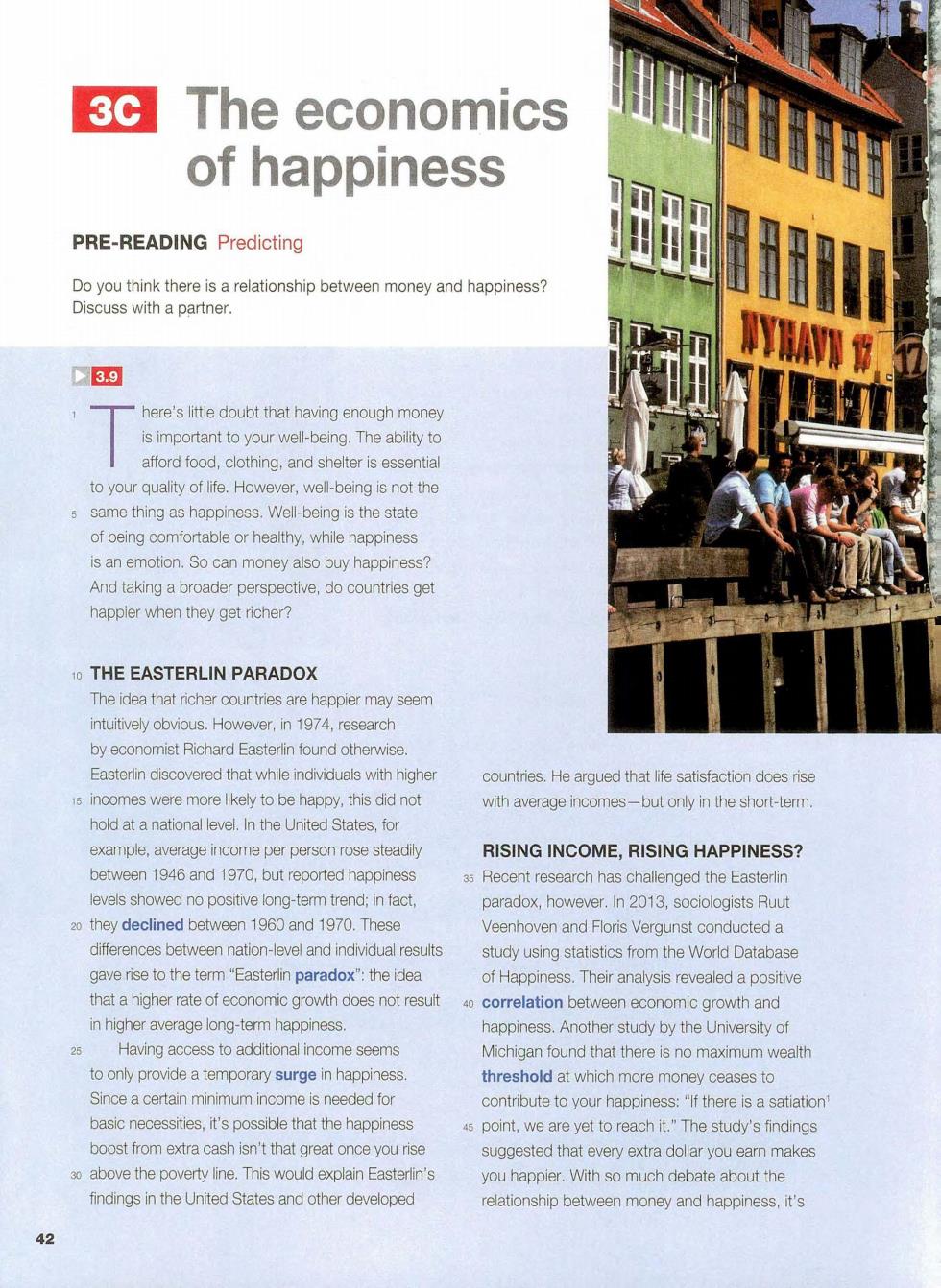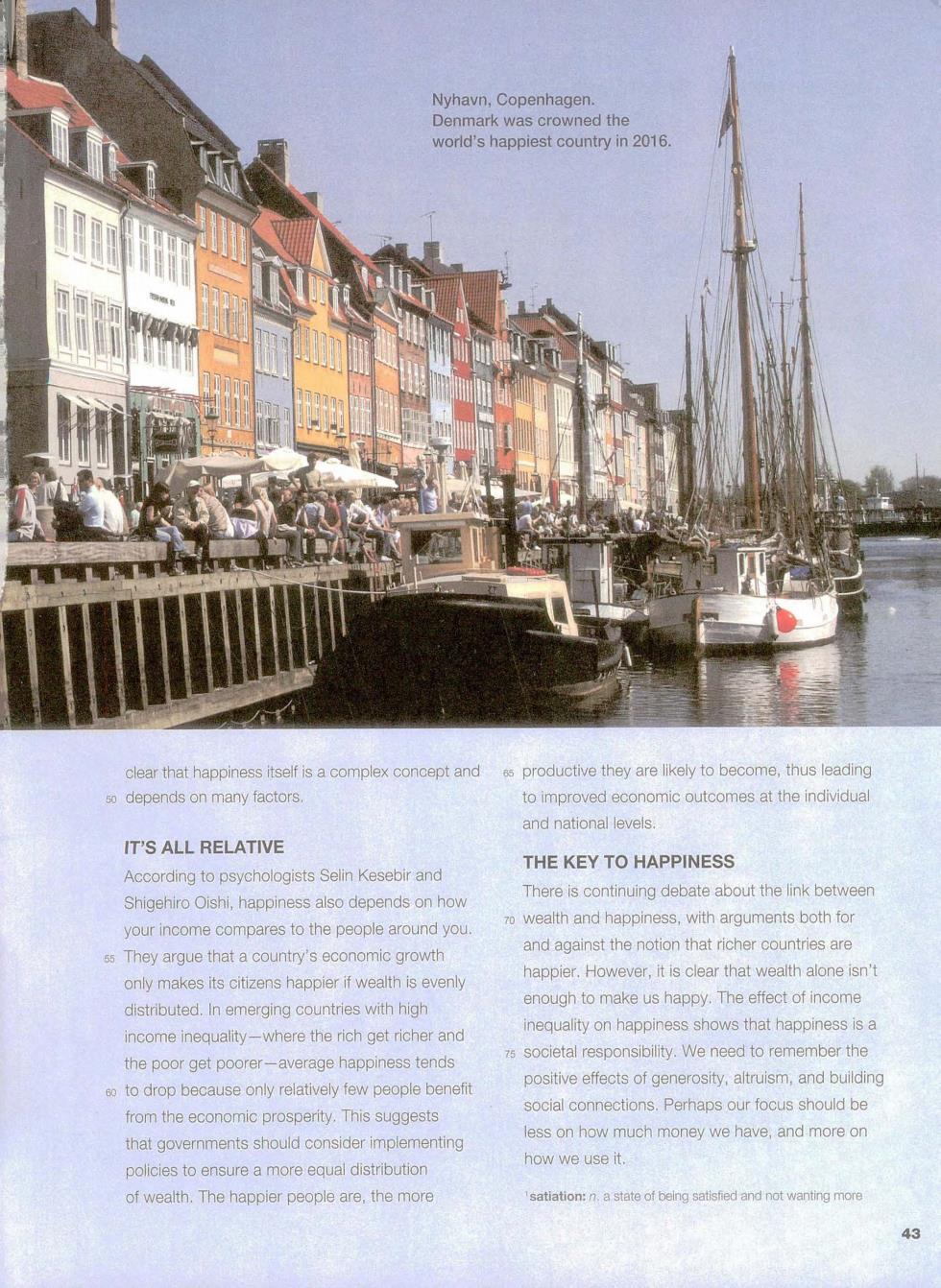
3c The economics of happiness PRE-READING Predicting Do you think there is a relationship between money and happiness? Discuss with a partner. 3.9 here's litle doubt that having enough money is important to your well-beina.The ability to afford food.clothing.and shelter is essential to your quality of life.However,well-being is not the s same thing as happiness.Well-being is the state of being comfortable or healthy.while happiness is an emotion.So can money also buy happiness? And taking a broader perspective,do countries get happier when they get richer? THE EASTERLIN PARADOX The idea that richer countries are happier may seem intuitively obvious.However.in 1974.research by economist Richard Easterin found otherwise Easterlin discovered that while individuals with highe countries.He argued that life satisfaction does rise sincomes were more likely to be happy,this did not with average incomes-but only in the short-term hod at a national level.In the United States,for example,average income per person rose steadily RISING INCOME,RISING HAPPINESS? between 1946 and 1970.but reported happiness as Recent research has challenged the Easterlin levels showed no positive long-term trend:in fact paradox,however.In 2013,sociologists Ruut 20 they declined between 1960 and 1970.These /eenhoven and Floris Vergunst conducted a differences between nation-level and indidual results study usina statistics from the world database gave rise to the term "Easterlin paradox":the idea of Happiness.Their analysis revealed a positive that a higher rate of economic growth does not resuit correlation between economic growth and in higher average long-term happiness nappiness.Another study by the University of 25 Havina access to additional income seems Michigan found that there is no maximum wealth to only provide a temporary surge in happiness threshold at which more mone ceases to Since a certain m is needed for ontribute to your happiness:"If there is a satiation basic necessities,it's possible that the happiness s Doint.we are vet to reach it.The study's findinas boost from extra cash isn't that great once you rise suggested that every extra dollar you eam makes above the poverty line.This would e explain Easterlin's you happier.With so much debate about the indings in the United States and other deve relationship between money and happiness,it's
42 ■ 3C e econom1cs ■ a 1ness PRE-READING Predicting Do you think there is a relationship between money and happiness? Discuss with a p~rtner. 1 m here's little doubt that having enough money is important to your well-being. The ability to afford food, clothing, and shelter is essential to your quality of life. However, well-being is not the s same thing as happiness. Well-being is the state of being comfortable or healthy, while happiness is an emotion. So can money also buy happiness? And taking a broader perspective, do countries get happier when they get richer? 10 THE EASTERLIN PARADOX The idea that richer countries are happier may seem intuitively obvious. However, in 197 4, research by economist Richard Easterlin found otherwise. Easterlin discovered that while individuals with higher 1s incomes were more likely to be happy, this did not hold at a nationalevel. In the United States, for example, average income per person rose steadily between i 946 and i 970, but reported happiness levels showed no positive long-term trend; in fact, 20 they declined between i 960 and i 970. These differences between nation-level and individual results gave rise to the term "Easterlin paradox": the idea that a higher rate of economic growth does not result in higher average long-term happiness. 2s Having access to additional income seems to only provide a temporary surge in happiness. Since a certain minimum income is needed for basic necessities, it's possible that the happiness boost from extra cash isn't that great once you rise 30 above the poverty line. This would explain Easterlin's findings in the United States and other developed countries. He argued that life satisfaction does rise with average incomes-but only in the short-term. RISING INCOME, RISING HAPPINESS? 35 Recent research has challenged the Easterlin paradox, however. In 20i 3, sociologists Ruut Veenhoven and Floris Vergunst conducted a study using statistics from the World Database of Happiness. Their analysis revealed a positive 40 correlation between economic growth and happiness. Another study by the University of Michigan found that there is no maximum wealth threshold at which more money ceases to contribute to your happiness: "If there is a satiation 1 45 point, we are yet to reach it." The study's findings suggested that every extra dollar you earn makes you happier. With so much debate about the relationship between money and happiness, it's

Nyhavn.Copenhagen. Denmark was crowned the world's happiest country in 2016. clear that happiness itself is a complex concept and productive they are likely to become,thus leading depends on many factors. to improved economic outcomes at the individual and national levels. IT'S ALL RELATIVE THE KEY TO HAPPINESS According to psychologists Selin Kesebir and Shigehiro Oishi,happiness also depends on how There is continuing debate about the link betwee o wealth and happiness.with arauments both for your income compares to the people around you. They argue that a country's economic growth and against the notion that richer countries are happier.However.it is clear that wealth alone isn't only makes its citizens happier if wealth is evenly distributed.In emerging countries with high enough to make us happy.The effect of income inequality on happiness shows that happiness is a income inequality-where the rich get richer and societal responsibility.We need to remember the the poor get poorer-average happiness tends to drop because only relatively few people benefi positive effects of generosity,altruism,and building social connections.Perhaps our focus should be from the economic prosperity.This suggests that govemments should consider implementing less on how much money we have,and more or how we use it. pollcies to ensure a more equal distribution of wealth.The happier people are,the mor 43
• I I Nyhavn, Copenhagen. Denmark was crowned the world's happiest country in 2016. ~ ~ 1111 ( I ~MIit.i ~~ ,1 ......, :i I I~~~ ill ]j I I. II I I clear that happiness itself is a complex concept and so depends on many factors. IT'S ALL RELATIVE According to psychologists Selin Kesebir and Shigehiro Oishi, happiness also depends on how your income compares to the people around you. 55 They argue that a country's economic growth only makes its citizens happier if wealth is evenly distributed. In emerging countries with high income inequality-where the rich get richer and the poor get poorer-average happiness tends so to drop because only relatively few people benefit from the economic prosperity. This suggests that governments should consider implementing policies to ensure a more equal distribution of wealth. The happier people are, the more 6s productive they are likely to become, thus leading to improved economic outcomes at the individual and national levels. THE KEY TO HAPPINESS There is continuing debate about the link between 10 wealth and happiness, with arguments both for and against the notion that richer countries are happier. However, it is clear that wealth alone isn't enough to make us happy. The effect of income inequality on happiness shows that happiness is a 1s societal responsibility. We need to remember the positive effects of generosity, altruism, and building social connections. Perhaps our focus should be less on how much money we have, and more on how we use it. satiation: n. a state of being satisfied and not wanting more • 43

UNDERSTANDING MAIN IDEAS Which sentence best summarizes the main idea of the passage? a The relationship between happiness and wealth is complex-it involves many societal and economic factors. b Happiness means different things to different people,and there is no clear link between wealth and happiness c People living in rich countries are happier and more productive than those in poor countries. UNDERSTANDING AN ARGUMENT Complete the sentences.Circle the correct words. 1 According to the Easterlin paradox,there is(a/no)positive correlation between a country's economic growth and average long-term happiness. 2 According to Veenhoven and Vergunst,people living in poor countries are(not/equally)as happy as those in rich countries. 3 According to Kesebir and Oishi,people tend to be happier when there is(high/low)income inequality BUILDING VOCABULARY A Match the words in blue from the passage to their definitions. 1 declined o a sudden increase 2 paradox 0 o became smaller,fewer,or less;decreased 3 surge 0 o the point at which something begins or changes 4 correlation o o a puzzling statement that contains two opposing truths 5 threshold o o a meaningful connection between two or more things B Complete the sentences using the words in A. 1 Income grew in the U.S.during the 1990s,but it in the 2000s. 2 Economists predict that the "Internet of Things"will lead to a in productivity. 3 Researchers have found a direct between happiness and good health 4 Easterlin's ideas are called a because he found that individual happiness does not correspond with the overall happiness level of a country. 5 Psychologist Daniel Kahneman found that the income for Americans is $75,000 a year.Beyond that,he believes,more money does not make them happier. C CRITICAL THINKING Reflecting Do you think a person can have too much money?Why or why not?Discuss with a partner. I don't think it's possible to have too much money because... I disagree.I think that... 44
44 UNDERSTANDING MAIN IDEAS Which sentence best summarizes the main idea of the passage? a The relationship between happiness and wealth is complex -it involves ma11y societal and economic factors. b Happiness means different things to different people, and there is no clear link between wealth and happiness. c People living i11 rich countries are happier and more productive than those in poor countries. UNDERSTANDING AN ARGUMENT Complete the sentences. Circle the correct words. 1 According to the Easterlin paradox, there is (a/ no) positive correlation between a country's economic growth and average long-term happiness. 2 According to Veenhoven and Vergunst, people living in poor countries are (not/ equally) as happy as those in rich countries. 3 According to Kesebir and Oishi, people tend to be happier when there is (high / low) income inequality. BUILDING VOCABULARY A Match the words in blue from the passage to their definitions. 1 declined o 2 paradox o 3 surge o 4 correlation o 5 threshold o o a sudden increase o became srnaller, fewer, or less; decreased o the point at which something begins or changes o a puzzling statement that contains two opposing truths o a meaningful connection between two or more things B Complete the sentences using the words in A. 1 Income grew in the U.S. during the 1990s, but it _______ in the 2000s. 2 Eco11omists predict that the "Internet of Things" will lead to a ________ in productivity. 3 Researchers have foL111d a direct ________ between happiness and good health. 4 Easterlin's ideas are called a ________ because he found that individual happiness does 11ot correspond with the overall happiness level of a country. 5 Psychologist Daniel Kahneman foL1nd that the income ________ for Americans is $75,000 a year. Beyond that, he believes, more money does not make them happier. C CRITICAL THINKING Reflecting Do you think a person can have too much money? Why or why not? Discuss with a partner. I don't think it's possible to have too much money because ... I disagree. I think that